
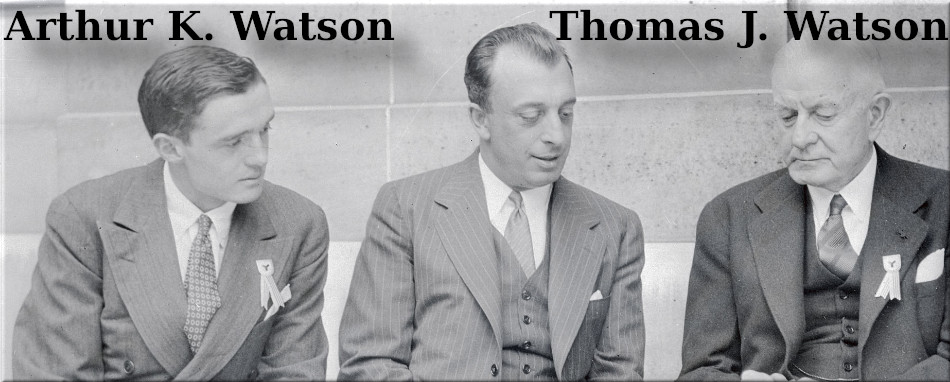
ONE recurring theme here this past spring/summer was IBM weaponising diversity to oust men whom it cannot control (such as Richard Stallman) whilst ignoring IBM's own guilt. As covered here twice before [1, 2], IBM's very leadership and top-level officials have much to hide themselves. Their history with women isn't exactly stunning. It just takes a bit of effort to better understand what happened and at the moment we dig up very old press archives (1960s and 1970s) though "if anything is written," an associate emphasised, "the direct relevance to today's organization must be clearly visible. Arthur K. Watson (AKW) has been dead for almost half a century." Here's an old article about his appointment and his death one decade later. He died quite early.
Just over a year ago, in October 2015, IBM disclosed to its shareholders that the company was facing (yet another) SEC investigation. This time, federal agents opened up a probe into how Big Blue reported revenue on “certain transactions” in the United States, the UK, and Ireland. In layman’s terms, it means that the SEC is looking into whether or not IBM is cooking the books.
Surprised? I’m not.
The jury’s still out on that particular case, but I’ve been doing my own research and investigation into IBM for the last decade, and the new revelations fits within a certain pattern: IBM gets implicated or accused of some corporate wrongdoing, the company “cooperates” with investigators, and then — just maybe — the government will slap them with a relatively minor fine. But more often than not, it seems to me, nothing happens, and it’s business as usual.
Don’t believe me? Well, that’s why I’ve compiled this handy guide that exposes the long and sordid history of IBM’s alleged violations, both domestic and abroad. Though the company has defended itself in every single case, the list does not paint a pretty picture: There are multiple cases of bribery, fraud, corruption, and bid-rigging. And they appear to be happening with increasing frequency.
1993 — 2000, Argentina: Bribery through Swiss bank accounts
Let’s begin with one of the first IBM bribery cases on record.
In Argentina, the scandal was front-page news: Three high-level executives at IBM were caught bribing government officials with multi-million dollar kickbacks, routed through Swiss bank accounts, in order to win a $250 million contract to modernize the computer system of Argentina’s largest government-owned bank.
[...]
2004–2009, South Korea and China: Slush funds and fake invoices with more than 100 IBM employees involved.
Only a few years after the Argentina scandal, IBM was accused of another overseas bribery case — this time in South Korea and China.
[...]
2013, Poland, Argentina, Bangladesh and Ukraine: “Allegations relating to transactions…”
For this case, it looks like the SEC took a break and let the Department of Justice try its hand at investigating the overseas alleged fraud.
[...]
2011–2014, India: Did top IBM executives cook the books in India?
The important thing to know about IBM’s troubles in India is the scope of what happened: repeat accounting troubles over a period of several years. While this may have been swept under the rug in American media, after doing my own research, IBM’s trouble in India (where it has likely over 100,000 employees) gives me a lot of concern.
[...]
2013, USA: IBM under investigation for how it reports cloud revenue
May 2013 was apparently busy month at IBM and the SEC.
As noted above, in the spring of 2013, the SEC opened up investigations into IBM abroad. But at the same time, SEC also apparently opened up an inquiry into IBM in the United States.
[...]
2013–2016, Australia: “The worst failure of public administration in Australia’s history” — IBM is banned from doing business with Queensland’s government
The average American probably has no idea that IBM is completely banned as a contractor within Queensland’s government. Yes, really.
[...]
2015, Canada: Another bribery case at IBM
More allegations continue to surface that IBM is bribing government officials.
[...]
2015 — Present:
Bribery always involves phony books and records — it’s necessary to hide the transactions on the balance sheet. And in order to circumvent internal controls, bribery usually requires the involvement of senior management.
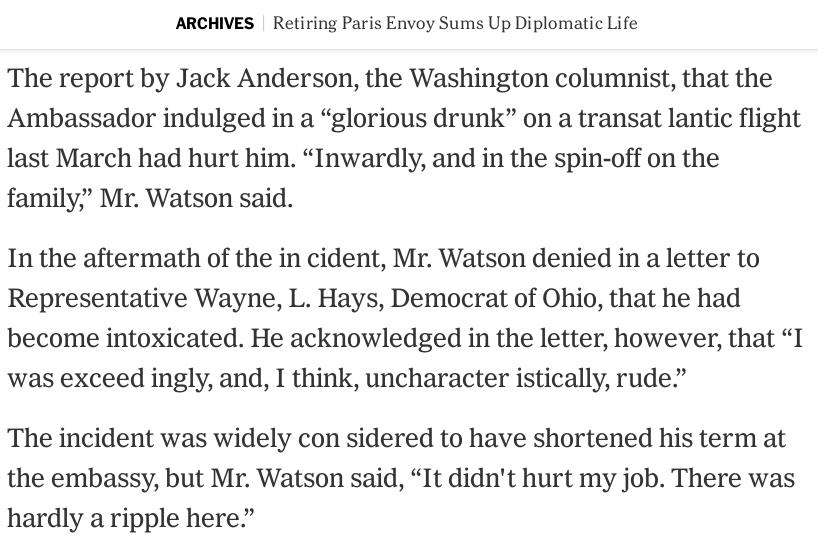
The report by Jack Anderson, the Washington columnist, that the Ambassador indulged in a “glorious drunk” on a transatlantic flight last March had hurt him. “Inwardly, and in the spin–off on the family,” Mr. Watson said.
In the aftermath of the incident, Mr. Watson denied in a letter to Representative Wayne, L. Hays, Democrat of Ohio, that he had become intoxicated. He acknowledged in the letter, however, that “I was exceedingly, and, I think, uncharacteristically, rude.”
The incident was widely considered to have shortened his term at the embassy, but Mr. Watson said, “It didn't hurt my job. There was hardly a ripple here.”
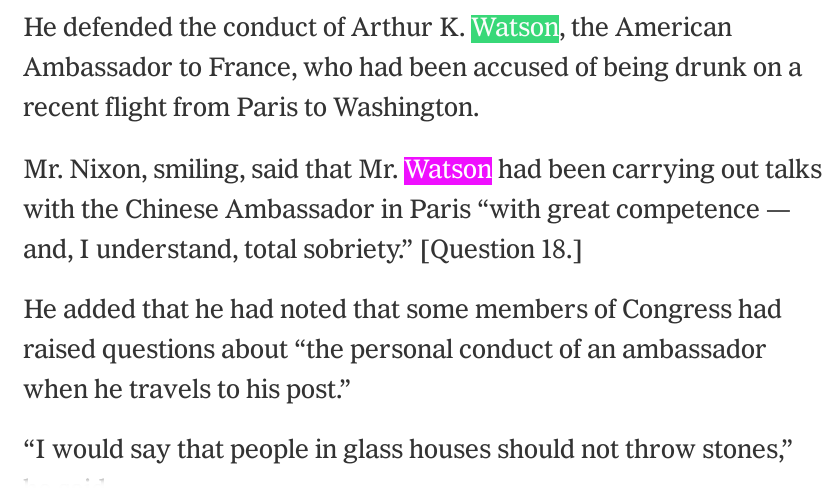
He defended the conduct of Arthur K. Watson, the American Ambassador to France, who had been accused of being drunk on a recent flight from Paris to Washington.
Mr. Nixon, smiling, said that Mr. Watson had been carrying out talks with the Chinese Ambassador in Paris “with great competence — and, I understand, total sobriety.” [Question 18.]
He added that he had noted that some members of Congress had raised questions about “the personal conduct of an ambassador when he travels to his post.”
“I would say that people in glass houses should not throw stones,” he said.
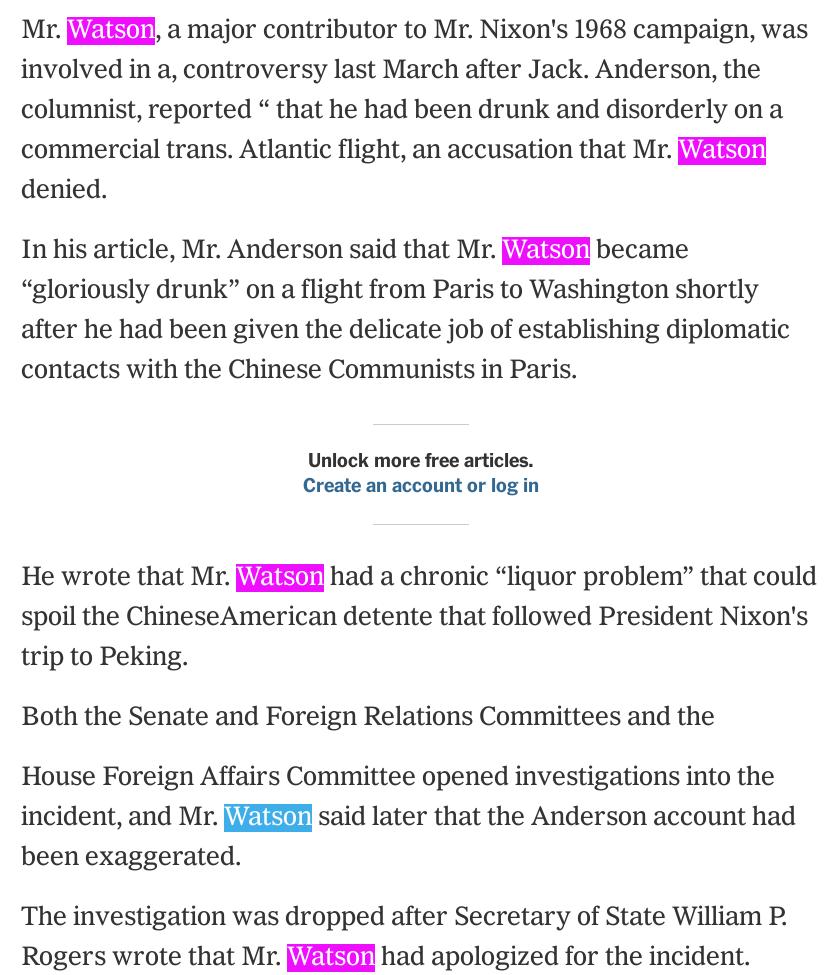
Mr. Watson, a major contributor to Mr. Nixon's 1968 campaign, was involved in a, controversy last March after Jack. Anderson, the columnist, reported “that he had been drunk and disorderly on a commercial trans. Atlantic flight, an accusation that Mr. Watson denied.
In his article, Mr. Anderson said that Mr. Watson became “gloriously drunk” on a flight from Paris to Washington shortly after he had been given the delicate job of establishing diplomatic contacts with the Chinese Communists in Paris.
He wrote that Mr. Watson had a chronic “liquor problem” that could spoil the Chinese American detente that followed President Nixon's trip to Peking.
Both the Senate and Foreign Relations Committees and the House Foreign Affairs Committee opened investigations into the incident, and Mr. Watson said later that the Anderson account had been exaggerated.
The investigation was dropped after Secretary of State William P. Rogers wrote that Mr. Watson had apologized for the incident.

The State Department expressed confidence today in Arthur K. Watson, Ambassador to France, following a newspaper columnist's report that he had been “gloriously drunk” on an airliner.
The columnist, Jack Anderson, said the incident occurred aboard a flight from London to Washington last Thursday when Mr. Watson was returning for consultations on establishing contacts with the Chinese Ambassador in Paris.
The department spokesman, Charles W. Bray 3rd, declined direct comment on the columnist's charges, but he said: “If you're asking whether the department has confidence in Ambassador Watson and whether Ambassador Watson will continue to carry out his ambassadorial functions and other functions in connection with the ambassador of the People's Republic of China, the answer is yes.”
Mr. Anderson quoted witnesses on the plane as saying:
“He kept up a holler for scotch and grabbed at passing stewardesses. He then tried to stuff $40 down the fronts of their blouses. Finally he passed out and slept for about three hours.”
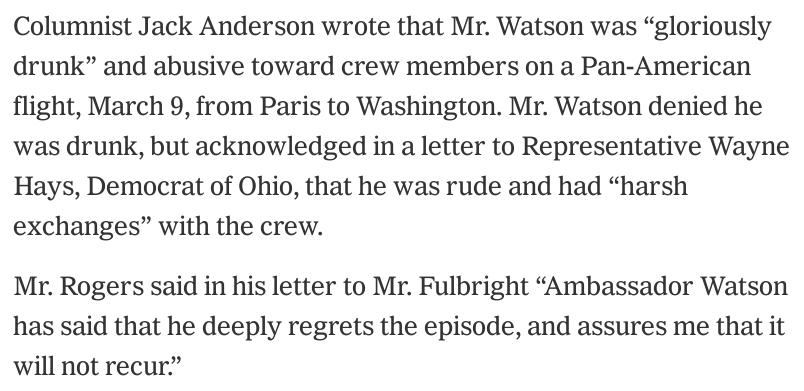
The Senate Foreign Relations Committee announced yesterday that it would drop its inquiry into an alleged drinking incident involving Arthur K. Watson, United States Ambassador to France.
Senator J. W. Fulbright, chair man of the committee, said the committee “does not expect to pursue the matter further.” He made public a letter on the subject from Secretary of State William P. Rogers.
Columnist Jack Anderson wrote that Mr. Watson was “gloriously drunk” and abusive toward crew members on a Pan–American flight, March 9, from Paris to Washington. Mr. Watson denied he was drunk, but acknowledged in a letter to Representative Wayne Hays, Democrat of Ohio, that he was rude and had “harsh exchanges” with the crew.
Mr. Rogers said in his letter to Mr. Fulbright “Ambassador Watson has said that he deeply regrets the episode, and assures me that it will not recur.”